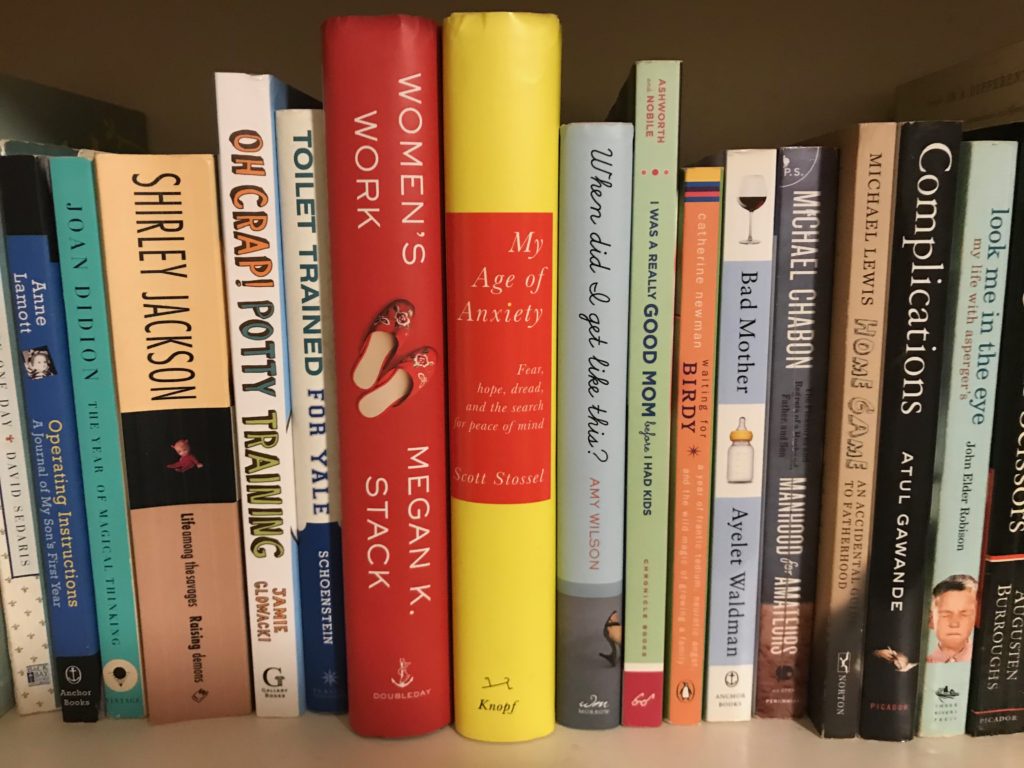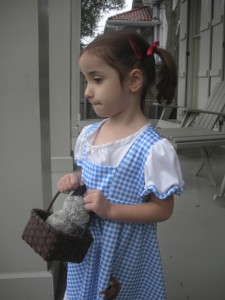
Early parenthood is hard. Instead of needing to solve every problem, how about just coping?
I’ve always been uptight, and it just got worse when I had kids. So I’ve been working on it, starting with Mardi Gras. One stifling Lenten morning by the sandpit, a woman hiked up her maternity shorts and said, “You can either have a tidy house or happy, healthy children.”
I felt a surge of love for her. People said things like that when my first child was a newborn, but I wrote them all off as slackers.
“Yes, indeed,” I said. “At our house the Mardi Gras bead situation is out of control, and I just turn my head and look the other way.” I learned this from a friend whose husband leaves the Christmas tree up until Easter.
A wispy-haired dad busted in, “You know, you have to watch those Mardi Gras beads because they’re from China. A lot of things from China have lead in them.” He patted his son’s wispy hair.
What is with these buzzkillers? First they try to peddle me the nonsense that is “nipple confusion,” and now they’re trying to take away my kids’ Mardi Gras?
My kids had spent the previous Fat Tuesday up in a ladder together, both with drawn-on mustaches but one dressed as U2’s The Edge and the other as a ballerina. That year, Margot woke us up on Mardi Gras day by hollering from her crib, “Hey, Mister! Throw me something!” Our kids were a couple of maniacs, and thank goodness because that’s a pre-requisite for being a native New Orleanian. Now I was supposed to worry about poisoning them by letting them play with beads their customary three months after the holiday? They were standing in cardboard boxes and throwing them over the side, not eating them.
By sandpit day the kids were two and four, and I’d learned how to ignore buzzkillers. I had every right to complain about them, too, having been one myself.
Breastfeeding was my first buzz-kill. There are tons of books on the subject, and tons of time to read while doing it.
When James was a week old, the grandfatherly head of the pediatric practice called one morning just to check in. I could hardly hear him over the screams. “Have you tried a pacifier?” he enunciated.
“Oh, no,” I shouted. “I’m breastfeeding.”
“So?” he roared.
“So, I don’t want him to get nipple confusion,” I said shrilly. The books said not to offer a pacifier or any nipple other than my own for the baby’s first two weeks. Otherwise, the child could possibly prefer the inferior nipple substitute and the whole thing was doomed.
There was a faint thumping and a muffled moan. “In my 40 years of practice, I have yet to encounter a single case of this ‘nipple confusion’ of which you speak. Now, while I’m on the phone, I want you to get a pacifier and put it in that baby’s mouth.”
I wish I could say it was smooth sailing from there, but it wasn’t. For me, it was natural to continue in early motherhood doing what I’d always done, which was looking for answers in books. For James, it was natural to scream the house down.
After James and I mastered breastfeeding, I read about screaming. There were lots of reasonable techniques in The Happiest Baby on the Block that helped a tiny bit with James, and later a lot with Margot (another screamer). I had high hopes for a book called Secrets of the Baby Whisperer, and read it like the Bible. It told me how, from the very beginning, I could “start as I meant to go on.” I could establish a routine during James’ first days and use that routine to increase sleep periods and decrease fussiness: Eat, Activity, Sleep, then Time for You. The acronym was EASY, but my baby wasn’t easy.
When the baby-care books failed, or, more precisely, made me feel like I’d failed, I went straight to the experts. We visited two pediatric gastroenterologists. The first advised me to go on a starvation diet, and later to stop breastfeeding and start soy formula. The second said that was a bunch of bunk and prescribed an antacid for James. He also said that it was possible I just had one of those fussy babies.
After living through nine months of fussiness with James, I came to a conclusion. Being a baby is uncomfortable, some babies are more sensitive to this than others, and some babies are harder to soothe than others.
I didn’t need a book to learn that time was the solution, and the choice was not what to do, but how to cope while waiting for the problem to vanish, or at least morph into another problem.
A mantra, perhaps, “Suck It Up,” would have done the job. Or, better yet, a mental image.
In the 70’s there was a soap commercial with the tagline, “Calgon, take me away!” The heroine was an embattled homemaker who relaxes in a frothy bubble bath and floats up into the clouds in a bubble tinged with pink.
In my version, it’s a gleaming white clawfoot tub and my skin is dewy because of both the bubbles and my serenity. As my bubble rises toward the playroom ceiling, I extend a soapy arm over the side of the tub. I gaze down at the children.
Below me, James is lying on his back, clutching a posterboard guitar that is ripped in two, yelling, “Right now, right now, right now you have to put it back together!” He spins clockwise, powered by his stiff little legs.
Just a few feet away, Margot is an island in a puddle of pee, looking down at her shoes quizzically. She looks up and says, “Oh, Mommy, look what happened.”
The doorbell and the phone ring at the same time.
I hear only the wet smack of the popping bubbles, smell only their lavender perfume. My skin is warm. How it glows.
I can only describe this feeling as a buzz.

